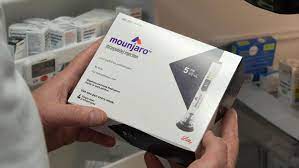A recent real-world study comparing the weight loss effects of two medications—Mounjaro and Ozempic—revealed that overweight and obese individuals using the injected drug Mounjaro experienced more substantial weight loss and were more likely to achieve specific weight loss goals compared to those on the similar competitor, Ozempic.
Both medications, Mounjaro (tirzepatide) and Ozempic (semaglutide), mimic the functions of the gut hormone GLP-1, which aids insulin production and regulates food passage in the stomach, thereby affecting appetite control. Additionally, Tirzepatide stimulates another gut hormone called GIP, potentially enhancing its impact.
While primarily prescribed for type 2 diabetes, these drugs have garnered attention for their weight loss potential.
The study, not yet peer-reviewed or published in a professional journal, aligns with clinical trial observations. Physicians, upon witnessing the outcomes in their diabetes patients, suspected Tirzepatide might be more potent. However, few head-to-head comparisons between these drugs exist, particularly among non-diabetic individuals. Although an ongoing investigation aims to address this gap, results are not expected for over a year.
Dr. Patricia Rodriguez, the study’s lead author from Truveta Research, emphasized the immense potential for these medications in a population where over 70% struggle with overweight or obesity.
The study, initiated by Truveta—a data analytics company owned by 30 US healthcare systems—examined patient records from May 2022 to September 2023.
Analyzing data from over 18,000 individuals, half with type 2 diabetes and the remainder without documented diabetes history, the researchers assumed this latter group used the medications off-label for weight loss.
Weight loss outcomes improved with prolonged medication use, although a significant number discontinued the drugs during the study period, possibly due to medication shortages.
Reported side effects, like nausea, vomiting, and gallstones, were relatively similar between the medications, with approximately one in five individuals experiencing nausea and vomiting and one in six reporting gallstones.
Those without diabetes experienced more weight loss on Mounjaro than Ozempic, and even among diabetic individuals, Mounjaro users lost a higher percentage of their initial weight compared to Ozempic users.
At three months, Mounjaro users lost around 6% of their weight compared to nearly 4% with Ozempic. By six months, the weight loss percentages were 10% for Mounjaro and 6% for Ozempic, rising to 15% and 8%, respectively, after 12 months. Adjusting for potential biases narrowed these differences.
According to Dr. Mopelola Adeyemo from the University of California at Los Angeles, the best weight loss drug for individuals is the one that suits them best, considering tolerance and effectiveness.
While Novo Nordisk and Eli Lilly, the respective manufacturers of Ozempic/Wegovy and Mounjaro/Zepbound, have different perspectives on the study’s findings, ongoing trials aim to shed more light on the efficacy of these medications for obesity and weight management.





